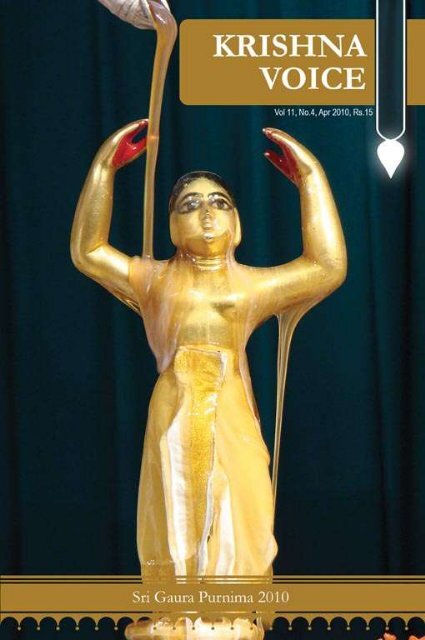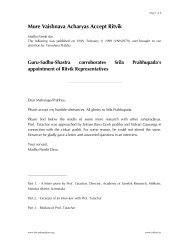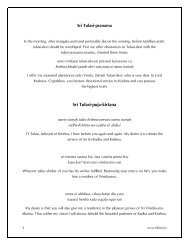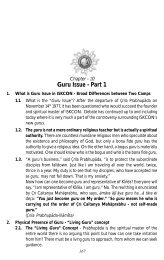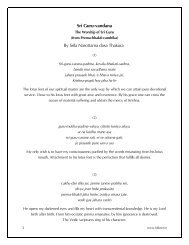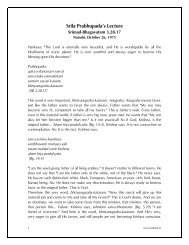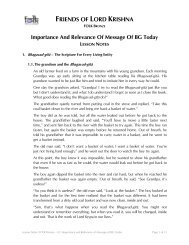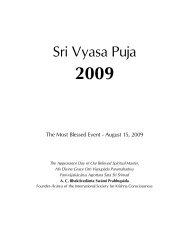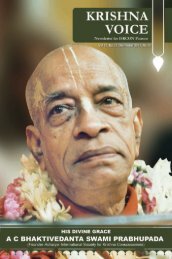Sri Gaura Purnima Celebrations - FOLKNet
Sri Gaura Purnima Celebrations - FOLKNet
Sri Gaura Purnima Celebrations - FOLKNet
- No tags were found...
You also want an ePaper? Increase the reach of your titles
YUMPU automatically turns print PDFs into web optimized ePapers that Google loves.
Vol 11, No.4Apr 2010CONTENTSEscape to Krishna 4<strong>Sri</strong>la Prabhupada Speaks Out 7Early to Bed 9Surely You Will Come to Me 10Science: The Vedic View 12The Teachings of Lord Chaitanya Part III 15His Divine Grace A. C. BhaktivedantaSwami Prabhupada, Founder-Acharya of the International Societyfor Krishna Consciousness, came toAmerica in 1965, at age 69, to fulfillhis spiritual master’s request that heteach the science of Krishnaconsciousness throughout the Englishspeakingworld. In a dozen years hepublished some seventy volumes oftranslation and commentary on India’sVedic literature, and these are nowstandard in universities worldwide.Meanwhile, travelling almost nonstop,<strong>Sri</strong>la Prabhupada moulded hisinternational society into a world wideconfederation of ashramas, schools,temples and farm communities. Hepassed away in 1977, in Vrindavana,the place most sacred to Lord Krishna.His disciples and followers are carryingforward the movement he started.Tracing the Hindu Heritage 18Please chant...Hare Krishna Hare Krishna Krishna Krishna Hare HareHare Rama Hare Rama Rama Rama Hare Hare...and be happy!Published and owned by Sankirtana Seva Trust,editing by Chamari Devi Dasi.Layout, design and graphics by ISKCON DesignGroup, Bangalore.For all information contact: Editor, KrishnaVoice, SST, Hare Krishna Hill, Chord Road,Bangalore - 560 010 INDIA Phone: 91-80-23471956, 91-80-2357 8346 Fax: 91-80-2357 8625.© 2010 Sankirtana Seva Trust, Bangalore. AllKrishna art and the works of <strong>Sri</strong>la Prabhupadaare © BBT International.All rights reserved throughout the world.Reproduction in any manner is strictlyprohibited.Printed for ISKCON, Bangalore, at ManipalPrinters (P) Ltd., Manipal.Cover pages-4Text pages-20Krishna Voice, Apr 2010 3
Escape to KrishnaA soul liberated from material bondage can't find refuge in impersonal oneness.A lecture given in Vrindavana, India, on March 18, 1974by His Divine Grace A.C. Bhaktivedanta Swami PrabhupadaFounder-Acharya of the International Society for Krishna Consciousnessnidraya hriyate naktam vyavayena ca va vayahdiva carthehaya rajan kutumba-bharanena va"The lifetime of an envious householder is passed at night either in sleeping or in sex indulgence, and in thedaytime either in making money or in maintaining family members."—<strong>Sri</strong>mad-Bhagavatam 2.1.3To be a householder, a married person, is not bad. That is not condemned. What is condemned? Apasyatam atmatattvam:to not know the aim of life.Ask anyone, "What is the aim of your life?" He will simply say, "It is my duty to earn money, to maintain my children,to give them education, to give them a good opportunity for their future. And if I have any extra money, then I cangive charity to the poor." These are his programmes. But no one knows the necessity of liberating the soul, whichis conditioned by the material covering. No one knows—not even big, big professors. If you ask, "Why are youconstructing some big, big scheme?" they will reply, "Oh, for the future generations." That's all.No one knows about the importance of the soul. No one has any vision of atma-tattva, the science of the soul.Everyone is simply talking superfluously. That is the defect today.The whole scheme of Vedic knowledge centers on the truth "I am not this body." Because people do not knowthat understanding this truth is the necessity of life, they have created so much news—big, big newspapers fullof rubbish news and advertisements. But you won't find any talk about the necessity of spiritual knowledge.To be a grhastha, a married person, is not bad. But to be unaware of the necessity of the soul—that is bad.The Mayavadis, or impersonalists, renounce married life as maya—illusion—and become sannyasis. But theyhave no idea what the goal of life is. They simply think in a negative way: "This married life is very troublesome."They have realized that even in the highest material position there is no happiness. Even President Nixon—thepresident of the richest country—has no happiness. He is embarrassed and attacked in so many ways, and hedoes not know how to defend himself or keep his position.Everyone is missing the point. No one sees, "Why am I embarrassed? I have become the president of the U.S.A.,and still I am embarrassed. When I was an ordinary lawyer, no one cared about me. At that time I was alsoembarrassed. I tried to improve my position, and now I have come to the highest point of success in the materialworld. Still I am embarrassed."One should question one's life in this way. But people cannot see things correctly. No one thinks, "I was embarrassedfrom the very beginning of my life. I was embarrassed even within the womb of my mother. I was packed in there.And when I came out of the womb I was also embarrassed. I could not express my pains and pleasures. Someant was biting me, and I was crying, but my mother gave me more milk, although I was fully fed."This is the baby's embarrassment. He wants something, but the mother gives him something else. The mothercannot understand the child's pain, because the child cannot express himself. Otherwise, why does the child cry?He's feeling some pain, but his mother does not know how to relieve it.Then comes childhood. I do not like to go to school, but my parents force me to go. More embarrassment. ThenI become married or enjoy sex life and have children. More embarrassment. Then I die and enter the womb of amother, where I may be killed by abortion.Our whole life is full of embarrassment. But the question "Why am I embarrassed?" does not arise.The Zero SolutionThe Mayavadis think, "Make me zero, void. Then there will be no pains and pleasures, no embarrassment."Impersonalism and voidism are the same thing: "Make it zero." The Mayavadis are like the foolish man who wantsto avoid all the embarrassment by committing suicide. He thinks, "If I end this body, then my embarrassment willbe finished."Krishna Voice, Apr 2010 5
People do not know how they—the soul—can get relief from all embarrassments. Apasyatam atma-tattvam. Noone sees, "I am spirit soul. My needs are different from those of the body."The body is only the temporary home for the soul. But we are always trying to keep this home very neat and clean.That is our business. We do not know that there is another business. That is our defect.It is the duty of every human being to understand atma-tattva, the science of the soul. Sanatana Gosvami madethat point when he went to Chaitanya Mahaprabhu. Sanatana Gosvami said, "I was a government minister, so Iwas quite comfortable. People called me a learned scholar, but I did not know why I was suffering despite beinga minister. And people say that I am a learned man, but I do not know how to get out of the suffering."People are trying to get out of the suffering, but they do not know how. They should inquire about that. They donot know the nature of atma, the soul, or what the atma wants and how the atma will be comfortable.Information about the atma is given by Lord Chaitanya. Jivera svarupa haya krsnera nitya dasa: "Every living entityis the eternal servant of Krishna." Therefore unless we come to the platform of serving Krishna, there is no questionof happiness. Krishna says the same thing. Duhkhalayam asasvatam: "This place is simply full of miseries."Changing CagesThe whole world is missing the point that we are not the body. The body is our encagement. Sometimes we geta golden cage, sometimes an iron cage, sometimes a silver cage, sometimes a wooden cage. And we think thatby changing the cage we will be happy. But as long as we are not free, we will not be happy. A bird kept in a cageis unhappy. The cage may be golden, but that doesn't matter. Similarly, we cannot be happy with this encagement.We must be free. That is called liberty, mukti. That is required.The Mayavadi philosopher thinks, "Suppose I get free. Where shall I go? I shall be free in the sky." That isimpersonalism. The sky is impersonal. If a bird is given freedom but he flies in the sky, will he be happy? No,because he wants more than that. So he'll think, "It was better in the cage. What is the value of this freedom? I'mnot happy." He'll return to the cage.In India people sometimes take a certain kind of bird in a cage to an open field. They open the door of the cage,and the bird walks and flies around for some time. He is given freedom. Then the person calls the bird, and thebird returns. The bird was thinking, "I have been given freedom now. But where shall I go? I have to eat." So hecomes back: "Better to live within this cage."The Mayavadi's position is like that. We devotees are sure we are going to Krishna. But the Mayavadis have noKrishna. Therefore they return to the material world. Because they have no shelter, they come back. They cannotstay very long in the impersonal feature of the Absolute.Therefore the Mayavada philosophy of voidism or impersonalism is not very good. You cannot stay impersonalor in a void, because you are a living entity, part and parcel of the supreme living entity, Krishna. Krishna isanandamayo 'bhyasat; He is always full of jubilation. So being part and parcel of Krishna, you also want jubilation.But how can you be jubilant in the sky, in the zero? That is the difference between Mayavada philosophy and thephilosophy of Krishna consciousness.You cannot be happy even by getting free from this encagement, the material world. And if you place yourself inimpersonalism and voidism, that will not help you.Try to understand this. Impersonalism and voidism will not help you. You have to go back home, back to Krishna,where everything exists in spiritual variety. You can play with Krishna. You can dance with Krishna. You can talkwith Krishna. You can fight with Krishna. Krishna's friends the cowherd boys fight with Him. They enjoy in that way.Everything in the spiritual world with Krishna is enjoyment.The Krishna consciousness movement is trying to give information to those mentioned as apasyatam atma-tattvam,those who do not know the nature of atma—what the soul wants and how the soul will be happy. They are tryingto be happy here within the cage. That's all. But that is not possible.Without knowing the philosophy of Krishna consciousness, people will be unhappy whether within the cage oroutside the cage. Their imagined liberty outside the cage is also unhappiness, because they do not know whereto go. Therefore after staying for some time in that impersonal stage, they return to the cage. That coming andgoing will not help them.Atma-tattva means to know the nature of the atma. That is all explained by Krishna in the Bhagavad-gita. If wetake advantage of His lessons and instructions, our life will be successful.Thank you very much.6Krishna Voice, Apr 2010
SRILA PRABHUPADA SPEAKS OUTYou Are Beyond This BodyThis exchange between His Divine Grace A.C. Bhaktivedanta Swami Prabhupada and some of hisdisciples took place in Fiji on May 1, 1976.<strong>Sri</strong>la Prabhupada: The Lord says, mamaivamso jivalokejiva-bhutah sanatanah. Find this verse.Disciple: All right, <strong>Sri</strong>la Prabhupada. That's in Bhagavadgita.Fifteenth Chapter, text seven. "The living entitiesin this conditional world," Krishna says, "are My eternal,fragmental parts." And then He adds, manahsasthanindriyaniprakrti-sthani karsati: "Due toconditioned life, they are struggling very hard with thesix senses, which include the mind."<strong>Sri</strong>la Prabhupada: So the soul uses his mindand intelligence—his subtle senses, hissubtle instruments—to manipulate hisgross machine, his material body. In thisway, he is just like an airplane pilot whouses his subtle electronic instrumentsto manipulate his gross machine, causingit to fly this way or that. Where is thedifficulty in understanding this? Thismaterial body in which we are now livingis simply a machine.And bhramayan sarva-bhutani:"All living beings in thismaterial world are simplywandering." Bhramayan—"wandering." Just as the pilotuses his airplane to wander here or there, so the souluses his material body to wander here or there. This isgoing on. Urdhvam gacchanti sattva-stha ... adhogacchanti tamasah: Sometimes the soul goes up;sometimes, down. Just as the pilot uses his airplane'swings and other features for going up or down, so thesoul uses his body's arms and other features for goingup or down. Find this verse.Disciple: That's in the fourteenth chapter of the Gita,<strong>Sri</strong>la Prabhupada. Text eighteen.urdhvam gacchanti sattva-sthamadhye tisthanti rajasahjaghanya-guna-vrtti-sthaadho gacchanti tamasah"Those situated in the mode of goodnessgradually go upward to the higher planets;those in the mode of passion live on theearthly planets; and those in theabominable mode of ignorance godown to the hellish worlds."<strong>Sri</strong>la Prabhupada: Sowhether we look at thesoul in the body orthe pilot in theplane, we see thesame thing. If thepilot is not expert,then at anuntimely momenthe goes down tothe lowest place.Finished. Adhogacchantitamasah. If thepilot is thirdclass, theninstead of flyinghigh, he plummetsfrom the sky, andeverything is spoiled.Therefore, everythingdepends on thepilot. Themachine isnot so7
important. The machine can go up if the pilot knowshow to do it. And the machine can go down. Actually,this is happening. If the pilot cannot handle his machinevery nicely, immediately it will be smashed. That is dueto the mismanagement of the pilot. At times I have seenthat as soon as the flight is over, the other passengersand the crew applaud. [Laughter as <strong>Sri</strong>la Prabhupadaclaps.] "The danger is over."Anyway, urdhvam and adhah: Depending on how youuse this bodily machine, you can go up, and likewise,you can go down. And madhye tisthanti rajasah: If youbecome passionately attached to these middle planets,then for still another lifetime you can stay here.So in this way, we must present this subject matter ofself-realization. The living entity, the soul, is the importantthing within this body. And just see how he's struggling.Due to ignorance of his real identity apart from the body,he's struggling. Manah sasthanindriyani prakrti-sthanikarsati: "On account of being entangled in this materialworld, the soul is struggling very hard with the six sensesof the material body, which include the mind." This ishis position.Disciple: <strong>Sri</strong>la Prabhupada, often you say thattransmission of this knowledge of self-realization requiresboth the proper speaker—Lord Krishna or His puredevotee—and also the proper hearer.<strong>Sri</strong>la Prabhupada: Yes. Only if somebody is interestedin knowing the truly important thing in life can heunderstand this knowledge, this science of selfrealization.But if he's an animal—simply eating, sleeping,and mating—what will he understand? An animal is notinterested in knowing how the world is working. He getshis food and sex; that's all. These are the animal'spropensities.But when the soul receives a human body, he mustcome to the human platform—inquisitive. Like SanatanaGosvami, he must ask, 'ke ami,' 'kene amaya jare tapatraya':"Who am I? Why must I endure all these miseries,culminating in death?" Of course, the modern animalistichuman is not interested in these essential questions.Instead he inquires, "How shall I develop my economicposition?" But Sanatana Gosvami already had a veryhigh-grade economic position and left it behind. He wasnot interested in such temporary affairs. He wasinterested in knowing, 'ke ami,' 'kene amaya jare tapatraya':"Who, actually, am I? And what is my position?Why I am suffering in this material atmosphere?" Thatis human life.Disciple: Returning to Bhagavad-gita, <strong>Sri</strong>la Prabhupada,isn't it also true that Arjuna asks these questions?<strong>Sri</strong>la Prabhupada: Oh, yes. Karpanya-dosopahata.Karpanya-dosa. "Due to miserly weakness, my dear8Krishna, I have neglected my real duty, which is tounderstand my actual, spiritual self and then serve You.Rather, I have been thinking about the bodily welfareof my nonsensical relatives and teachers, even thoughthey are waging a war to usurp my kingdom. What isthis foolishness? I know that."After all, no matter how tender my sentiments, whatbenefit will these rascals get? It may be that they aregoing to die in this war. But sooner or later, this way orthat, they are going to die. What can I do? So therefore,why am I perplexed about their bodily fate? I know thatthis is my defect. I cannot cause these living entities'deaths or births, nor can I prolong their lives. All this isbeyond my tiny jurisdiction. Still, I am anxious: If I killthem, then what will happen? What will happen?""You may kill them or not kill them, Arjuna," says Krishna."But rest assured, they'll be killed, today or tomorrow.Gatasun agatasums ca nanusocanti panditah: A learnedman knows that this material body will be finished, todayor tomorrow—so why be concerned about this body?"Concern should be for the person within the body—whether he's going to heaven or hell, up or down,urdhvam gacchanti or tamo gacchanti. This is the issueof real concern. The material body will be finished, todayor tomorrow or after a hundred years. Who can protectit? But one should be concerned about the body's owner:where he is going—what will be his next position. Andin Bhagavad-gita Lord Krishna clearly delineates thisissue. Urdhvam gacchanti sattva-stha, madhye tisthantirajasah, ... adho gacchanti tamasah: According to themodes of nature in which you are living your presentlife, you are deciding whether, in your next life, you willgo up or down or remain in the same status. Threeoutcomes are possible: up, down, or the same status.Disciple: Today, though, <strong>Sri</strong>la Prabhupada, people maysay, "I have a soul," but they live pretty degradedly, asif "Really, I am this material body—that's all there is."They live as if they'll have no next life. Or they think inthe next life they're automatically going upward, because,they say, they've accepted God or Jesus or Muhammadinto their heart. Meanwhile, they go on breaking God'slaws all over the place and just generally catering totheir bodily whims. Just living a low-grade life.<strong>Sri</strong>la Prabhupada: Therefore, they're rascals. And forthe rascals, Bhagavad-gita's teaching is there. Learn.People are giving far too much emphasis on the materialbody: "When this current body is finished, everything isfinished." They do not know anything beyond the body.But real knowledge begins when we learn, "No—youare beyond this body." This is real knowledge. This isthe beginning of knowledge. Any other knowledge exceptthis—that is ignorance. People are accepting ignoranceas knowledge.Krishna Voice, Apr 2010
Early to Bed...by Rohininandana Dasa<strong>Sri</strong>la Prabhupada taught that devotees of Krishna don't"live to sleep, but sleep to rest the body." They workhard for Krishna and rather unwillingly lie down forrejuvenating sleep. As it is said, "Sleep is sweet to thelabouring man." Devotees don't want to sleep long, likea bear, or sneak in more than they need.Devotees act to wake up in another sense too: they tryto wake up to their true position as spiritual persons,eternal servants of Krishna. They don't wish to fall backinto the dreamy slumber of being "English," "American,"or "Chinese," "man" or "woman," "Christian," "Muslim,"or "Hare Krishna monk." Of being young or old, awakeor asleep, fresh or tired, ill or well. They want to be firmlysituated in the absolute conception that they have nothingto do with the material body. To achieve this they adjustall relative aspects of their life.So devotees get up early to take advantage of thespecial energy and clarity of the early-morning hours.They also try to go to bed early. As an old proverb says,"One hour's sleep before midnight is worth three after."How much sleep do I need? Five, six, seven, eighthours?<strong>Sri</strong>la Rupa Gosvami, one of Lord Chaitanya's chiefdisciples, generally slept for only one and a half hours,and sometimes he didn't sleep at all. <strong>Sri</strong>la Prabhupadawent to bed at 10:00 P.M. and rose before midnight towrite his books. And he would rest for only another houror two during the day. Just imagine how much extratime we would have if we could consistently do thesame.But Lord Krishna recommends moderation andregulation. So we should find out how much sleep weneed and work from there to gradually decrease it. (Withpractice, roughly six hours should be about right.) Weare servants of Krishna, not sleep. By practice we canconquer sleep, become Krishna conscious, and attainsuccess in life.Besides seeing sleep as an opportunity to renew failingenergy, devotees see sleep as a reminder of irresistibledeath, which forces everyone, pauper or king, to liedown. Devotees acknowledge that they are not thecontroller of anything, even their eyelids. Before sleepinga devotee may humbly pray, "My dear Lord, if You likeI will awaken here in this place, or perhaps I will awakenin another place. But wherever I may be, or in whateverform You give me, please allow me to serve You."A few suggestions: Try reading or hearing about Krishnain the evening. Before going to sleep, resolutely considerwhat time you intend to rise and why—you may findyou don't even need an alarm. And last, when you wakeup, loudly chant "Hare Krishna!" and feel how the spiritualenergy quickly dissipates the effects of the mode ofignorance. Sweet dreams.Krishna Voice, Apr 20109
Surely You Will Come to MeThe Divine, Eternal Promises of the LordBy Bhranti Devi DasiIn the summer of the year 2000, something happenedthat would drastically change the lives of my family andme. It would also test our faith in Krishna and make usview life with a new awareness—an awareness of death.We were traveling across America when, in the opencountry of Wyoming, the back tire on our minivanshredded and flew off. The car went out of control andafter flipping over several times, landed upside down.One of my sons, Keshava Kumara, sustained a headinjury that would take his life the following day. He wasonly twelve years old. We did all we could to preparehim spiritually for his passing. He left this world markedand anointed with tilaka, Yamuna water, and Vrindavanadust, and with his hands resting on <strong>Sri</strong>la Prabhupada’sbooks.Time seemed to lose all meaning, as we were one dayon a family vacation, one day at the hospital, and oneday at the crematorium. When the doctor had informedus that he would not survive his injury, my first thoughthad been, “This life is ruined for me.” The bubble ofillusion of a happy life in this world had been popped.I had never before felt so disoriented. How was thispossible? Seven months earlier we had been inVrindavana-dhama and had plans to return there afterthe summer. This seemed to be a nightmare that justcouldn’t be true.At Keshava’s bedside we had desperately struggled totake shelter of the verses describing the immortality ofthe soul in the Second Chapter of the Bhagavad-gita.The sudden loss of a loved one must be the mostbewildering thing. It took months for me to grasp thereality of it. Intense grief can be very isolating, as it israre that anyone around you can understand the depthof your pain.Later, as I reread the Gita and prayed to <strong>Sri</strong>la Prabhupadato help me through this, I noticed that so many of theverses spoken by the Lord are in the form of promises,divine and eternal. Lord Krishna declares that we areeternally joined to Him. He speaks words of love andassurance, shining like a lighthouse in the dark.Dictionaries define a promise as “a verbal commitment,”“a pact,” “grounds for expectation.” Any promise is aprecious agreement, but how much more precious whenit comes from the heart of God and is eternal. As He isomnipotent, there is no possibility that He will be unableto fulfill His promises, as may be the case with a humanpromise, however sincere. It occurs to me that a promise10is a gift—one that is spoken. I held fast to theseassurances of the Lord, taking heart in them and receivingsolace and comfort.I thought, “If I am eternally joined to the Supreme Lord,then so is my son—so is everyone.”Every living being, every soul, has an intrinsic, eternalrelationship with Krishna. In the Bhagavad-gita the Lordspeaks timeless wisdom to Arjuna, and it is meant forall souls, for all time. I would like to share with you sixof Lord Krishna’s promises. I hope that you will findencouragement in these eternal promises of love, givento everyone by the Supreme Lord Himself.Six Promises by Lord Krishna<strong>Sri</strong> Krishna promises: “Therefore, Arjuna, you shouldalways think of Me in the form of Krishna and at thesame time carry out your prescribed duty of fighting.With your activities dedicated to Me and your mind andintelligence fixed on Me, you will attain Me withoutdoubt.” (8.7)This is not a vague promise, but a clear and concretestatement. The First Canto of <strong>Sri</strong>mad-Bhagavatampresents a similarly clear statement on the result ofhearing about the glories of the Lord: “Loving serviceunto the Personality of Godhead is established as anirrevocable fact.” Irrevocable: permanent, cannot bechanged. Whatever we do for Krishna in this life ispermanent and will stay with us even after the demiseof this one body and this one temporary life.<strong>Sri</strong> Krishna promises: “Engage your mind always inthinking of Me, become My devotee, offer obeisancesto Me, and worship Me. Being completely absorbed inMe, surely you will come to Me.” (9.34)This is such a beautiful promise. <strong>Sri</strong>la Prabhupadastates in the purport to this verse that we should bethinking of Krishna in devotional love and continuallycultivating knowledge of Him. This is our part in a veryreal and reciprocal relationship.In writing about the reciprocal relationship between theLord and the devotee, <strong>Sri</strong>la Prabhupada uses beautifulimagery in the purport of verse 9.29: “The Lord and theliving entities eternally glitter, and when a living entitybecomes inclined towards the service of the SupremeLord he looks like gold. The Lord is a diamond, so thiscombination is very nice.”<strong>Sri</strong> Krishna promises: “To those who are constantlyKrishna Voice, Apr 2010
devoted to serving Me with love, I give the understandingby which they can come to Me.” (10.10)The words used here are “constantly devoted,” whichindicate devotion without pause or cessation, continuallyflowing. Many people may worship God for some materialbenefit, and that is pious, as they are submitting theirprayers to Him. But here in this verse Krishna speaksabout those persons who desire only Him.We cannot go to Krishna on our own power. If He ispleased with us, He gives us passage. From thebeginning of the universe, the Vedas are there as guides,and down through the ages the Lord continually sendsincarnations and saintly persons to bring transcendentalknowledge to the jiva souls.That we must take shelter of a bona fide guru completelydevoted to the Lord is a very important point and cannotbe overestimated. Arjuna’s accepting Krishna as hisguru is a great turning point in the Bhagavad-gita. Afterexhibiting apparent grief, lamentation, and bewilderment,Arjuna says, “I am a soul surrendered unto you. Pleaseinstruct me.” (2.7) Our modern society places greatemphasis on credentials, but people tend to take adviceon spiritual matters from anyone who writes an interestingbook on the subject. But life is temporary, and ourconnection with God is the most important area of study.We have to take care in selecting a teacher, just as wetake care in selecting a doctor. We wouldn’t trust oursurgical operation to a doctor who has no otherqualification than being a good storyteller.<strong>Sri</strong> Krishna promises: “My dear Arjuna, he who engagesin My pure devotional service, free from thecontaminations of fruitive activities and mentalspeculation, he who works for Me, who makes Me thesupreme goal of his life, and who is friendly to everyliving being—he certainly comes to Me.” (11.55)<strong>Sri</strong>la Prabhupada says in the purport to this verse thatanyone who wants to be intimately connected to Krishnamust take to the formula Krishna presents here. Hegoes on to say that this verse is the essence of theBhagavad-gita. Lord Krishna here describes the devoteeas someone friendly to every living being. In a songpraising the six Gosvamis of Vrindavana, <strong>Sri</strong>nivasaAcharya says they were “popular with both the gentleand the ruffians, because they were not envious ofanyone.”How can we exhibit real caring and friendliness towardeveryone? By spreading Lord Krishna’s formula, so thatpeople won’t miss the extremely valuable opportunityafforded by the human form of life, and so that they canbecome freed from all the miseries in this world. Wecan even benefit those souls not presently in humanbodies by loudly chanting the holy name and by givingthem prasadam, food offered to the Supreme Lord.<strong>Sri</strong> Krishna promises: “Just fix your mind on Me, theSupreme Personality of Godhead, and engage all yourintelligence in Me. Thus you will live in Me always,without a doubt.” (12.8)As in 8.7, the Lord is again using the reassuring phrase“without a doubt.” In the purport <strong>Sri</strong>la Prabhupada states:“One who is engaged in Lord Krishna’s devotionalservice lives in a direct relationship with the SupremeLord, so there is no doubt that his position istranscendental from the very beginning. A devotee doesnot live on the material plane—he lives in Krishna.”<strong>Sri</strong> Krishna promises: “Always think of Me, become Mydevotee, worship Me, and offer your homage unto Me.Thus you will come to Me without fail. I promise youthis because you are My very dear friend.” (18.65)I chose this verse for a memorial plaque placed in frontof a young oak tree at the last school Keshava attended,in Alachua, Florida. I find this promise from the SupremeLord to be so comforting, so personal—He really doesknow every one of us, and He really does want us tocome to Him.In the purport <strong>Sri</strong>la Prabhupada refers to this particularmessage from Krishna as a promise. It is a surely avery personal, reassuring message. “Because you areMy very dear friend—because you are connected withMe in a relationship—I am revealing these secrets toyou.”The most confidential knowledge is how to becomereestablished in our original relationship with Krishna.That is the most secret of all secrets. In VrindavanaMahimamrita <strong>Sri</strong>la Prabodhananda Sarasvati writes, “Idesire to achieve the highest mood [of love for God],which is a secret even to the Vedas.”<strong>Sri</strong>la Prabhupada also tells us in the purport to thispromise that we should concentrate our mind on theform of Krishna as described in the Brahma-samhita:a blackish boy with two hands, a beautiful lotuslike face,a flute, and peacock feathers in His crown. This is theform of Shyamasundara, a form so attractive that itattracts the minds and hearts of everyone.The grief resulting from the loss of a child puts yourvery sanity to the test. Arjuna experiences symptomsof grief by even contemplating the loss of familymembers, and does go on to lose one of his sons in thebattle. The loss of my son turned my world upside down.But Krishna’s promises are precious lifelines that I trust.They have saved me from despair time and time again.I pray to be able to perform my part in divine reciprocationwith the Lord, and to have unshakable faith that Hiseternal promises will be fulfilled, in every glorious aspect.“You will come to Me without fail. I promise you thisbecause you are My very dear friend.” (18.65)Krishna Voice, Apr 2010 11
It was 9:00 P.M., April 22, 1886. The four researchers—Ochorowicz,Marillier, Janet, and A. T. Myers—crept quietly through the desertedstreets of Le Havre and took up their stations outside the cottageof Madame B. They waited expectantly. Then it happened. "At 9:25,"Ochorowicz later wrote, "I saw a shadow appearing at the gardengate: it was she. I hid behind the corner in order to be able to hearwithout being seen." (1)At first the woman paused at the gate and went back into the garden.Then at 9:30 she hurried out into the street and began to make herway unsteadily toward the house of Dr. Gibert. The four researchersfollowed as unobtrusively as possible. They could see she wasobviously in a somnambulistic state. Finally she reached Gibert'shouse, entered, and hurried from room to room until she found him.This was an experiment in long-distance hypnotic influence. MadameB., a person easily hypnotized, was the subject of many experimentsarranged by Professor Pierre Janet and Dr. Gibert, a prominentphysician of Le Havre. In these probes they were joined by F. W.H. Myers of the Society for Psychical Research, the physician A. T.Myers, Professor Ochorowicz of the University of Lvov, and M.Marillier of the French Psychological Society.On this occasion the plan was that Dr. Gibert remain in his studyand try to mentally summon Madame B. to leave her cottage andcome see him. The cottage was about a kilometer from his house,and neither Madame B. nor any of the people living with her hadbeen told that the experiment would take place. Gibert began issuinghis mental commands at 8:55 p.m., and within half an hour shebegan her journey to his house. F. W. H. Myers wrote that out oftwenty-five similar tests, nineteen were equally successful. (2)This strange story tells of a kind of venture that meets with disapprovalboth from modern science and from the Vedic literature. The reasonstell us something interesting about both.Let me begin by discussing how Dr. Gibert's experiment is seen byscientists. We rarely hear much about people being able to influenceothers at a distance by mental commands. But many similarexperiments have been performed. Here is another example fromthe late nineteenth century.One Dr. Dufay was using hypnosis to treat Madame C. for periodicheadaches and sickness that the usual medical treatments hadfailed to relieve. He found he was able to put her to sleep andawaken her by mental commands, sometimes at a distance.On one occasion when called out of town, he arranged that MadameC.'s husband telegraph him when one of her headaches began andthen report any later developments by a second telegram.One morning at ten o'clock he received a telegram announcing thata headache had begun. So he mentally ordered the woman to sleep,and at four o'clock he ordered her to awaken. The husbandtelegraphed that she had gone to sleep at ten a.m. and awakenedat four. The distance between Dr. Dufay and Madame C. was about112 kilometers. (3)Experiments of this kind fall within a field of study that early in thiscentury was called psychical research and today is more often calledparapsychology. This field deals with apparent powers of the humanmind that are "paranormal," or hard to explain using acceptedphysical theories. Distant mental influence is a classic example of12Science: The Vedic ViewOn Mystic Perfections and Long-Distance HypnosisKrishna Voice, Apr 2010by Sadaputa Dasasuch a power.How most scientists view parapsychology was once summed up byDr. James Alcock of Toronto's York University in the journal Behavioraland Brain Sciences. He wrote: "Although there has been over acentury of formal empirical inquiry, parapsychologists have clearlyfailed to produce a single reliable demonstration of 'paranormal,' or'psi,' phenomena.... Indeed, parapsychologists have not evensucceeded in developing a reasonable definition of paranormalphenomena that does not involve, or imply, some aspect of mindbodydualism." (4)Here Alcock brings up two important points. The first is that paranormalphenomena have not been reliably demonstrated. The experimentsof Dr. Gibert and Dr. Dusart may indeed seem unreliable. They wererather loosely organized and didn't use the strict laboratory protocolswe expect in scientific work. But many carefully planned tests ofdistant influence have been performed in laboratory settings.For example, take the work done in the 1920's by Professor LeonidVasiliev of the University of Leningrad. In one series of tests a subjectnamed Fedorova would arrive at Vasiliev's laboratory at about 8p.m. After about twenty minutes of rest and conversation, she wouldlie on a bed in a darkened chamber. She was told to keep squeezinga rubber balloon attached to an air tube as long as she was awake,and to stop squeezing it when she began to fall asleep. The air tubewas hooked up to an apparatus in the next room that recorded whenshe would fall asleep and wake up. While in the darkened room,she had no further contact with the experimenters.When Fedorova entered the room, the experimenter who had beentalking with her would signal a colleague, called the sender, whowas waiting two rooms away. The sender would then climb into aspecial lead-lined chamber and open a letter prepared in advanceand not yet read by the subject, by the sender, or by the otherexperimenter. This letter would instruct the sender to do one of threethings: (1) stay within the lead-lined chamber and mentally orderthe subject to go to sleep, (2) stand with his head outside thechamber and issue the same mental commands, or (3) stand withhis head outside the chamber and make no commands.To show the kind of results Vasiliev obtained, here is a list of howlong it took the subject to go to sleep in twenty-nine runs of this test.(5) The times are in minutes and seconds.TIME TO GO TO SLEEPWithout With mental With mentalmental suggestion from suggestion fromsuggestion inside chamber outside chamber7'10" 5'10" 3'50"4'15" 1'25" 2'15"4'20" 3'40" 10'00"8'10" 3'40" 4'00"6'10" 3'55" 4'30"14'10" 3'20" 3'50"6'05" 4'15" 1'05"6'10"3'05"7'10"11'00"6'50"7'35"14'00"4'05"Krishna Voice, Apr 2010 13
It seems the subject was falling asleep faster when aperson two rooms away was mentally ordering her todo so.Vasiliev ran many other carefully organized experimentsof this kind, and he reported similar results. In onesuccessful test, mental commands for sleeping andwaking were even sent from Sebastopol to Leningrad,a distance of 1,700 kilometers.Such research, of course, is rejected by scientists likeAlcock. The methodology, they will argue, is flawed. InVasiliev's experiment, neither the subject nor the personstalking with her should know whether a command tosleep will be given. But how do we know that thiscondition was met? The experimenter talking with thesubject might have learned what was in the envelopeand cued the subject, either deliberately or inadvertently.This might have influenced how fast the subject fellasleep. Or the subject might have cheated by pretendingto doze off faster when the command to sleep wasgiven.Many scientists will insist that results such as those ofVasiliev must be tossed aside unless the work is ironcladagainst fraud. Yet many scientific experiments lesscautious of fraud are accepted. Why the stricter standardfor parapsychology?Here we come to Alcock's second point—that paranormalphenomena imply some kind of mind-body dualism.When Vasiliev started his experiments, he argued thatdistant transmission of influences from one person toanother must work through electro-magnetic waves. Itmust be a kind of radio, in which one brain sends signalsto another.As long as Vasiliev was able to argue this, his researchwas accepted and funded in the Soviet Union. But hisexperimental findings soon ruled out the radio hypothesis.For example, with the subject Fedorova the averagetime before sleep was the same whether the mentalcommands were sent within the lead-lined chamber oroutside it. The chamber was designed to block radiowaves, but it seemed to do nothing to halt mental signals.These and other findings convinced Vasiliev that knownforms of radiant energy were not involved in transmittingmental commands. But as soon as this became known,the support for Vasiliev's work was cut off, and remotemental influence was officially condemned in the SovietUnion as "an antisocial idealist fiction about man'ssupernatural power to perceive phenomena which,considering the time and place, cannot be perceived."(6)Here too in the West, scientists reject the idea that themind can do things that violate the known laws ofphysics. To them, such phenomena must be miracles,14and they follow the philosopher David Hume in saying,"No testimony is sufficient to establish a miracle, unlessthe testimony be of such a kind that its falsehood wouldbe more miraculous, than the fact which it endeavorsto establish." (7) Since there is nothing miraculous aboutfraud, scientists still prefer it as the proper answer foranomalous parapsychological data.Now, turning from modern science to the Vedic literature,we find a different outlook on the oddities we've beendiscussing.According to the <strong>Sri</strong>mad-Bhagavatam, there are eightprimary siddhis, or mystic powers. These ultimatelycome from the potency of Krishna, and since all livingbeings are Krishna's parts and parcels, living beingsare potentially able to manifest these powers to a minutedegree. From the Vedic point of view, this is completelynatural and not at all miraculous.One of the eight siddhis, called vasita, is described by<strong>Sri</strong>la Prabhupada as follows:"By this perfection one can bring anyone under hiscontrol. This is a kind of hypnotism which is almostirresistible. Sometimes it is found that a yogi who mayhave attained a little perfection in this vasita mysticpower comes out among the people and speaks all sortsof nonsense, controls their minds, exploits them, takestheir money, and then goes away." (8)This power is similar to the power of distant mentalinfluence studied by Vasiliev and others. But here wefind that the natural hypnotic power they studied can,it seems, be made stronger by appropriate techniquesof yoga.The point that yogis who acquire the vasita siddhi oftenuse it to cheat people fits well with at least one idea ofmodern science. Scientists tend to think that peopleclaiming this power are mostly cheaters, and the Vedicview agrees. Many psychics use their abilities, allegedor real, to separate foolish people from their money, andthis gives a bad name both to psychics and to paranormalphenomena in general.This brings us to an important Vedic point about themystic siddhis. In the Uddhava-gita section of <strong>Sri</strong>mad-Bhagavatam (11.15.33), Krishna says, "Learned expertsin devotional service state that the mystic perfectionsof yoga I have mentioned are impediments and a wasteof time for one practicing the supreme yoga, by whichone achieves all perfection in life directly from Me."Thus scientists and great devotees both regard mysticsiddhis as undesirable. For scientists they distract peoplefrom "scientific truth," and for devotees they distract onefrom the path of service to the Supreme Personality ofGodhead.Krishna Voice, Apr 2010
The Teachings of Lord Chaitanyaby His Divine Grace A.C. Bhaktivedanta Swami PrabhupadaFounder-Acharya of the International Society for Krishna ConsciousnessPart IIIActually all the Vedic literature directs the humanbeing toward the perfect stage of devotion. Thepath of fruitive activities, speculation, knowledgeand meditation do not actually lead one to theperfectional stage, but the Lord actually becomesapproachable by the process of devotionalservice; therefore one is recommendedthroughout all the Vedic literature to acceptthe process of devotional service. LordChaitanya quotes in this connectiona verse from the <strong>Sri</strong>madBhagavatam, 11th Canto, 14thChapter, in which the Lordsays, "My dearUddhava, neither philosophicalspeculation nor yogaachievements, nor penancescan give Him such pleasure ascan devotional service practicedby the living entities. He can beachieved only by devotional service,and He is dear only to the devotees.If a person born in the lower orlowest family of humanity is adevotee, then he becomesfreed from all contamination.Devotional service is the onlypath to achieve the SupremePersonality of God."This is also the onlyperfection accepted in allVedic literature. As a poorman, upon receiving sometreasure, becomes atonce happy, similarlywhen one attainsdevotional service,automatically thepains of materialexistence arevanquished.As oneadvances in devotionalservice, one attains love ofGodhead, and as he advancesin the love for the Supreme hebecomes free from all materialbondage. Disappearance of povertyand liberation from bondage are not,however, the end results of love ofKrishna. Actually, the love of Krishna orlove of God exists in relishing thereciprocation of loving service. In allVedic literature one will find thatattainment of this loving relationshipof the Supreme Lord by the livingentities is the function of devotionalservice. Our actual function isdevotional service, and our ultimategoal of achievement is love ofGodhead. Therefore in all Vedicliterature Krishna is the ultimatecenter. By knowledge of Krishna,all problems of life are solved.The Lord said that according toPadma Purana, there are differentPuranas for worshipping differenttypes of demigods, but suchindications for worship only bewilderpersons into thinking that thedemigods are Supreme. And yet ifthe Puranas are scrutinized andstudied it will be found that Krishna,the Supreme Personality of Godhead,is the only object of worship. Forexample, in the Markandeya Purana,there is mention of Devi worship, worshipof the goddess Durga or Kali. But in thatsame Chandika it is also stated that allthese demigods—whether in the shape ofDurga or Kali—are different energies ofVishnu. Therefore, even the study ofKrishna Voice, Apr 2010 15
the Puranas will reveal Vishnu, the Supreme Personalityof Godhead, to be the only object of worship. Theconclusion is that directly or indirectly all types of worshipare more or less indicating a worship of the SupremePersonality of Godhead, Krishna. In the Bhagavad-gitait is confirmed that anyone who worships other demigodsis in fact only worshipping Krishna because the demigodsare different parts of the body of Vishnu or Krishna. Thatsuch worship of demigods is really irregular is clearlystated in the Bhagavad-gita: Abidhipurvakam. <strong>Sri</strong>madBhagavatam confirms this also by the question: Whatis the object of worshipping different types of demigods?In Vedic literature there are three divisions of ritualisticactivities; one is called karma-kanda, or purely ritualisticactivities; another is called upasana, or speculating onthe Supreme Absolute Truth. What then is the purposeof the ritualistic sections of Vedic literature, and what isthe purpose of different mantras or hymns indicatingthe worship of different types of demigods? And whatis the purpose of philosophical speculation on the subjectof the Absolute Truth? The <strong>Sri</strong>mad Bhagavatam repliesthat all these different methods defined in Vedic literaturesindicate the worship of the Supreme Lord, Vishnu. Theyare all indirect ways of worshipping the SupremePersonality of Godhead. Sacrifices contained in theritualistic portion of the literatures are to satisfy theSupreme Lord Vishnu because yajna is specificallymeant to satisfy Vishnu. Vishnu's Name is alsoYogeshvara, or Lord of the Yogis. The neophytes arenot all on the transcendental level; therefore accordingto their situations in the different modes of materialnature they are recommended to worship different typesof demigods so that gradually they may rise to thetranscendental plane and be engaged in devotionalservice of Vishnu, the Supreme Personality of Godhead.For example, it may be said that some of the neophytesare attached to flesh eating, and for them, the Puranasprescribe that they can eat flesh after offering it to thedeity Kali.The philosophical sections of the Vedic hymns are meantto enable one to distinguish the Supreme Personalityof Godhead from maya. After indicating the position ofmaya, the Supreme Personality of Godhead isapproached in pure devotional service. That is thepurpose of philosophical speculation. This is confirmedin the Bhagavad-gita in the 7th Chapter, Bahunamjanmanam ante... "The philosophical speculators andempiric philosophers, after speculating for many, manybirths, ultimately come unto the Supreme Lord Krishna,and accept that Vasudeva is everything." Therefore allVedic rituals and different types of worship orphilosophical speculation are all ultimately aiming atKrishna.The Lord then told Sanatana Goswami about Krishna'smultiforms and His unlimited opulence; he also describedthe nature of the spiritual manifestation, the material16manifestation, and the manifestation of the living entity.He also informed Sanatana Goswami that the planetsin the spiritual sky, known as Vaikunthas, and theuniverses of the material manifestation are to be knownas different types of universes, for they are creativemanifestations of the two different types of energies,namely the material energy and the spiritual energy.Therefore as Krishna Himself is concerned, He is directlysituated in His spiritual energy, or specifically in Hisinternal potency. To help us understand the differencebetween the manifestation of the spiritual energy andthe material energy, there is a clear analysis in theSecond Canto of <strong>Sri</strong>mad Bhagavatam of the twomanifestations. Also, Sukadeva Goswami, bycommenting of verse one of the Tenth Canto, makes aclear analytical study as follows. Lord Chaitanya acceptsSukadeva Goswami as an authorized commentator onthe <strong>Sri</strong>mad Bhagavatam. Therefore He quotes his writingin this connection, and He explains that in the TenthCanto of the Bhagavatam the life and activities of Krishnaare described because Krishna is the shelter of all othermanifestations. Therefore Sukadeva Goswamiworshipped and offered his obeisance unto Krishna,the shelter of everything.This purport maintains that in this world there are twodifferent principles; the one principle is the origin, or theshelter of everything, and the other principle is thededuction from the original principle. The principle onwhich everything rests, as it is confirmed in the <strong>Sri</strong>madBhagavatam, begins janmadyasya, and in the VedantaSutra the same aphorism appears, janmadyasya—theSupreme Truth is the shelter of all manifestations. ThatSupreme Truth is called ashraya. All other principleswhich remain under the control of the ashraya-tattva,or the Absolute Truth, are called ashrita, or subordinatecorollaries and reactions. The purpose of the materialmanifestation is to give the conditioned soul a chanceto become liberated and return to the ashraya-tattva,or the Absolute Truth. So everything that is created inthe cosmic creation is dependent on the ashrita-tattva,or the Supreme Absolute Truth. As such, in the creativemanifestation or the Vishnu manifestation, and in differenttypes of demigods and manifestations of energy, theliving entities, the material elements—everything, isdependent on Krishna, the Supreme Truth. In the <strong>Sri</strong>madBhagavatam everything, directly and indirectly, isindicated to have Krishna as the Supreme Shelter.Therefore the analytical study of Krishna is the perfectknowledge, as it is confirmed in the Bhagavad-gita.Lord Chaitanya described the different features of LordKrishna in the following manner, and asked SanatanaGoswami to hear attentively: He said that Krishnaoriginally is the son of Nanda Maharaja and He is theAbsolute Supreme Truth. He is the cause of all causes,Lord and He is the origin of all emanations and allincarnations, but there in the Vraja or Goloka VrindavanaHe is just like a young boy. His form is eternal, full ofKrishna Voice, Apr 2010
liss and full of knowledge Absolute. He is the shelterof everything, and He is the proprietor or master ofeverything. In this connection Lord Chaitanya givesevidence from Brahma Samhita, fifth chapter, first verse,which states that Krishna is the Supreme Personalityof Godhead and His body is full of knowledge, eternaland blissful. He is the original person known as Govindaand He is the cause of all causes. Therefore, Krishnais the original Personality of Godhead; He is full of allsix opulences and His abode is known as GolokaVrindavana, the highest planetary system in the spiritualsky. Lord Chaitanya also quotes a verse from the <strong>Sri</strong>madBhagavatam, the First Canto, third chapter, in which itis stated clearly that all the incarnations described inthat particular verse are either direct expansions ofKrishna or are indirectly expansions of the expansionsof Krishna. But the Krishna name mentioned there isthe original Personality of Godhead, and He appearson this earth, in this universe or in any other universewhen there is a disturbance created by the demons,who are always trying to disrupt the administration bythe demigods.To understand Krishna, there are different processes:the process of empiric philosophical speculation, theprocess of meditation in the mystic yoga system, andthe process of Krishna Consciousness, or devotionalservice. Accordingly, in these different process, 1) byempiric philosophical speculation, the feature ofimpersonal Brahma or Krishna is understood; 2)by theprocess of meditation of yogi mysticism, the feature ofthe Supersoul all-pervading expansion of Krishna isunderstood; and 3) by devotional service in full KrishnaConsciousness, the original Personality of Godhead,Krishna, is realized. In this connection Lord Chaitanyaquotes first from the <strong>Sri</strong>mad Bhagavatam, First Canto,2nd chapter, which states that those who are knowersof the Absolute Truth describe the Absolute Truth inthree features: some describe the Absolute as impersonalBrahman, and some describe the Absolute Truth as thelocalized all-pervading Supersoul, and some know thatthe Absolute Truth is the Supreme Personality ofGodhead, Krishna. In other words, Brahman, theimpersonal manifestation, and Paramatma, the localizedmanifestation, and the Supreme Personality of Godheadare one and the same, but according to the differentprocesses adopted He is realized in different featuresknown as Brahma, Paramatma and Bhagavan.Impersonal Brahman realization is simple realization ofthe effulgence emanating from the transcendental bodyof Krishna. We compare this effulgence of thetranscendental body of Krishna to the sunshine—justas the sun disc is there, the sun planet is there, and thesun god is there, and the sunshine is the shiningeffulgence of that original sun god, similarly, Brahmajyoti,the spiritual effulgence or impersonal Brahman, is nothingbut the personal effulgence of Krishna.To support this version Lord Chaitanya quotes oneimportant verse from Brahma-Samhita where LordBrahma says, "I worship the Supreme Personality ofGodhead, Govinda, by whose personal effulgence thereis the unlimited manifestation of the Brahmajyoti, andin that Brahmajyoti (the impersonal manifestation ofKrishna's bodily effulgence) there are innumerableuniverses, each full of innumerable planets." LordChaitanya further describes that the Paramatma allpervadingfeature situated in everyone's body is but apartial manifestation or expansion of Krishna, butbecause Krishna is the Soul of the soul, there He iscalled Paramatma, or the origin of Paramatma. In thisconnection Lord Chaitanya quotes one verse from<strong>Sri</strong>mad Bhagavatam concerning the talks of MaharajaParikshit, while hearing about the transcendentalpastimes of Krishna in Vrindavana, inquired from hisspiritual master Sukadeva Goswami as to why theinhabitants of Vrindavana were so much attached toKrishna. To this question Sukadeva Goswami answeredthat Krishna should be known as the Soul of all souls;He is the Soul of all individual souls and He is also thesoul of the localized Paramatma. He was present inVrindavana for the benefit of all human beings andtherefore He was acting just like a human being to attractpersons to Him and to show that He is not formless. Heis also as good as other human beings, but He is theSupreme and other living beings are all subordinate toHim. All living beings therefore can enjoy spiritual bliss,eternal life and full knowledge in His association. LordChaitanya quotes also a verse from Bhagavad-gita inwhich the Supreme Lord speaks to Arjuna about Hisdifferent kinds of opulences, saying that He Himselfenters into this universe by one of His plenary portions,just like Garbohodakshayi Vishnu, and He also entersin each universe as the Ksirodakshayi Vishnu and thenexpands Himself as Supersoul in everyone's heart.Therefore, He says, if anyone wants to understand theSupreme Absolute Truth in perfection, he must take tothe process of devotional service in full KrishnaConsciousness. Then it will be possible for him tounderstand the last word of the Absolute Truth.FastingApr 25Apr 26Ekadashibreak fastMay 10May 11Ekadashibreak fastKrishna Voice, Apr 201017
<strong>Sri</strong> <strong>Gaura</strong> <strong>Purnima</strong> <strong>Celebrations</strong>Above & left: Devotees at ISKCONBangalore’s <strong>Sri</strong> Radha KrishnaMandir offered the utsava vigrahaof <strong>Sri</strong> Nitai <strong>Gaura</strong>nga an elaborateabhisheka on the occasion of <strong>Sri</strong><strong>Gaura</strong> <strong>Purnima</strong>, in the temple’s OpenAir Theatre.Right: The Deities of <strong>Sri</strong> Nitai<strong>Gaura</strong>nga were taken on a pallakkiprocession around the templepremises before the abhisheka.Devotees performed Harinamakirtana and danced before the Lord,to the beat of the ecstatic kirtana.
<strong>Sri</strong> <strong>Gaura</strong> <strong>Purnima</strong> <strong>Celebrations</strong>(left) HUBLI: Deities of <strong>Sri</strong> <strong>Sri</strong> Nitai <strong>Gaura</strong>ngaare bathed in a ceremonial abhisheka.(right) MYSORE: <strong>Sri</strong> <strong>Sri</strong> Nitai <strong>Gaura</strong>nga enjoy aride in a specially made pond.(left) VISAKAPATNAM: Devotees offerabhisheka to <strong>Sri</strong> <strong>Sri</strong> <strong>Gaura</strong> Nitai.(right) MANGALORE: <strong>Sri</strong> <strong>Sri</strong> Nitai <strong>Gaura</strong>nga receiveabhisheka seva.24Krishna Voice, Apr 2010
Krishna Voice Monthly Magazine, April 2010 Vol11, No.4 Price Rs 15/-Posted on 5th or 10th of the Month at MBC, Manipal, License to post without prepayment No. WPP(CO-8), Reg No. KA/BGGPO2521/ 2009-11, Registered with Registrar of Newspapers for India under No. RNI 71022/99, Posted at MBC, Manipal, 576104.24


